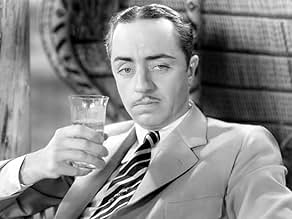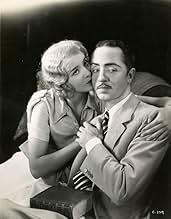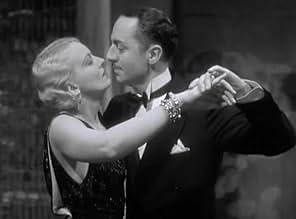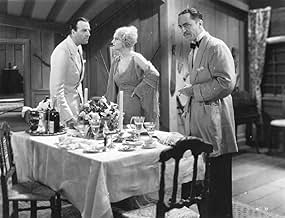Ajouter une intrigue dans votre langueGossip, snobbery, mistrust, divorce and a mail-order engagement dominate the lives of the British upper class living in the plantation colonies of Southeast Asia.Gossip, snobbery, mistrust, divorce and a mail-order engagement dominate the lives of the British upper class living in the plantation colonies of Southeast Asia.Gossip, snobbery, mistrust, divorce and a mail-order engagement dominate the lives of the British upper class living in the plantation colonies of Southeast Asia.
- Réalisation
- Scénario
- Casting principal
- Nikki
- (as Tyrrell Davis)
- Ali, March's Servant
- (non crédité)
- Bridge Player on Ship
- (non crédité)
- Reginald
- (non crédité)
- Mr. Everard
- (non crédité)
- Birthday Party Guest
- (non crédité)
- Simpson
- (non crédité)
- Mrs. Everard
- (non crédité)
- Desk Clerk at Club
- (non crédité)
- Ayah
- (non crédité)
- Photographer at Birthday Party
- (non crédité)
Avis à la une
Powell's charismatic as usual but he can't breathe much life into this tired script. It's a clichéd story, even for the time. Not exciting or particularly interesting, at least for my tastes. Reading the other reviews here, I'm kind of blown away by the praise. I had to check my TV to make sure we're all talking about the same movie. I like William Powell as much as the next person but this is mediocre stuff.
Hugh Dawltry (William Powell) is returning to Khota, a British colony in southeast Asia, after having been ostracized there for breaking up a home and then abandoning the woman afterwards. Phillippa Crosby (Doris Kenyon) is going to Khota to marry her long time fiance Dr. George March (Louis Calhern). Dawltry pretty much earns his reputation as a bounder during the first fifteen minutes as he is attracted to Phillippa on the ship to Khota, is rebuffed, and then when the ship docks, takes advantage of the fact that she doesn't know what Marsh's house looks like to take her to his house instead, where he continues to try and seduce her. It doesn't help that the servant Dr. March sent to retrieve Phillippa from the ship decided to get drunk instead. Things get straightened out, Phillippa and George get married as planned, but it soon becomes obvious that her husband is consumed by work, just got married because it was time for "family values", and is completely lacking in romance. Suddenly Dawltry's spiel is looking good to Phillippa versus her cold as ice husband.
This is one of those films that is very hard to review because it is just so average and lacking in originality. It doesn't do anything so badly that it is "so bad it is good", but it is not memorable either. The best thing about it are the performances, and the minute you see that Calhern is the prospective bridegroom you know this is not going to be a marriage made in heaven. Calhern never played the heroic or admirable type after all. This was William Powell's first film at Warner Brothers after leaving his long time studio of Paramount, and you would have thought that WB would have made this first film a special effort, but they didn't. I will say that the pounding of the native drums at the end do a good job of building suspense. I'd recommend this one for hardcore William Powell fans who want to see everything in which the actor appeared.
The above-the-title star is William Powell, with a "mid-lantic" accent, in the Marshall-Rathbone role as a local cad with a fondness for other men's wives (and, like his "Thin Man" character, for prodigious quantities of hard liquor that seems to have little or no degenerative effect on his looks or bearing). Supporting him are Louis Calhern, with his own "mid-lantic" accent, as an absurdly stuffy local doctor and Doris Kenyon as Calhern's new wife who immediately regrets her marriage to the workaholic martinet in the suffocating backwater. Marian Marsh is Calhern's younger sister who develops an adolescent crush on Powell.
Colin Campbell and Douglas Gerrard provide silly comic relief, strolling through the proceedings at intervals as veddy British stereotypes named "Reginald" and "Simpson," respectively, who constantly argue about the real meaning of what they've just said to each other. Tyrell Davis, so memorable as "Ernest" in the 1933 film version of Maugham's "Our Betters," despite billing in the opening credits, is wasted, appearing in only two or three group scenes and speaking one minor line. Ethel Griffies also gets practically nothing to do. Alison Skipworth as an overbearing matron has a couple of heavy-handed flirtations with both Powell and Calhern.
Most of the male characters spend a good deal of time mopping sweat from their faces, which is no surprise given the suits and ties most of them wear; Powell dresses as if he's on his way to the opera at the height of the fall season in London and Calhern sleeps in full length pajamas under blankets no less. The females are better off in this regard and occasionally wear loose dresses with short sleeves while daintily fanning themselves.
The producers went to some length to provide convincing atmospherics. When bride-to-be Kenyon arrives at Khota, she is greeted by a downpour that turns the dirt road into a river of mud through which she trudges until Powell, whose linen suit is drenched through, rescues her by giving her a lift on his native-driven rickshaw. (Needless to say, not a trace of dirt can be seen on her footwear, nor a wrinkle in his garments, afterward.) There is a celebrated tracking sequence through the jungle that separates Kenyon's house from Powell's, which starts at her face in closeup and ends on his in closeup and then alternates between the two, all to the rhythmic pounding of drums in honor of the local "love goddess."
As for the "natives," Calhern slaps one of them for drinking on the job and another, gleaming with sweat, is seen puffing a cigar while leering at the newly-arrived Kenyon, who is the real star here, always convincing, despite being a bit long in the tooth for the type of innocent-young-thing role she's playing, and magnetic from every angle. At different moments this barely remembered holdover from the silent era evokes Constance Bennett, Tallulah Bankhead, Thelma Todd and even Marlene Dietrich in her "Shanghai Express" period, even though she predates them all.
This film stars William Powell and Doris Kenyon. They are living in the hot jungles of Khota in Southeast Asia. Kenyon is a new bride to a boring doctor who treats the natives. Powell is a ladies' man and cad. He has a past of seducing married women and ruining their lives and marriages.
When Powell meets Kenyon and goes after her, he realizes that she is "the real thing" and falls for her. Marian Marsh plays Kenyon's young sister who also goes after Powell at the same time.
I don't normally care for Powell when he is playing the shallow role of a rouge and a blackguard. But in this film, he has a slow awakening and redeems his character into something with more depth and quality.
I was not as familiar with Doris Kenyon's work. I just saw her in "Alexander Hamilton" released in 09/12/1931 with Arliss. She was good in that, but she really shines in this film.
Then end is nice. It is logical and works well.
So whether you are a fan of Powell or not, check out this classic. You will be glad you did!! It will keep you classy!
Le saviez-vous
- AnecdotesNYT notes that this was William Powell's first starring role for Warner Brothers. He made a total of nine films at the studio.
- GaffesThe footage of the natives and drum players was used again when Hugh and Phillipa looked at them when they were in his bungalow.
- Citations
Dr. George March: [Upon finding his wife at Dawltry's house] There's going to be no scandal in my house. But Dawltry is leaving Khota for good!
Philippa Crosby March: And so am I, George. And I'm also leaving YOU. I came out here in search of love, and happiness. I found instead a machine - a machine of cold steel. As cold as the instruments you use to probe the bodies of unconscious patients on operating tables... Nursing hasn't changed me from a woman. But surgery in the tropics has changed the man I came to marry. So I turned to Hugh Dawltry for the love and affection you didn't give me.
Dr. George March: If I didn't know that you were suffering from a pathological complaint common to the tropics, I should think you were neurotic. It's just a physical heat wave!
Dr. George March: [Now turning to glare at Hugh Dawltry] And that CAD took advantage of it!
Philippa Crosby March: But not of me, George. YOU did that! All you wanted was a wife. ANY woman would have done as well. And some other woman can take my place from now on!
Meilleurs choix
- How long is The Road to Singapore?Alimenté par Alexa
Détails
- Date de sortie
- Pays d’origine
- Langue
- Aussi connu sous le nom de
- The Road to Singapore
- Lieux de tournage
- Société de production
- Voir plus de crédits d'entreprise sur IMDbPro
- Durée
- 1h 9min(69 min)
- Couleur

























